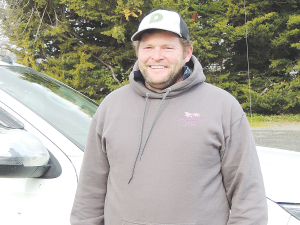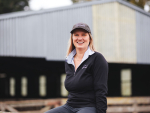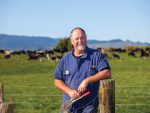Dairy News was invited to sit in on the weekly meeting Craigmore Farming Northern Operations manager Hayden Fletcher holds with the managers of the four Craigmore farms he is responsible for – Landsend, Darnley, Riverend, and Caithness.
Outside on the farms, the grass growth is slow, the ground is sodden and muddy, and the wind bitingly cold with snow on the surrounding hills. Calving is well underway, so Hayden’s team is busy and stress levels are high when they convened for their weekly team meeting over lunch with Hayden at the pub.
However, the fire is going and Hayden runs a very open meeting, with each manager giving him their topline numbers – such as number of cows calved so far – and providing feedback on everything from animal health issues to staff problems and machinery breakdowns.
These notes go into his minutes, but the team meetings are not really about ‘reporting up’ to Craigmore operations.
“My original purpose for these meetings was really to get the guys off the farm for a while and share any concerns or problems,” says Hayden.
Hayden managed Darnley for nine years before moving up to a role overseeing all four farms for Craigmore. He has been in the position his team is now in and so knows the pressures they face and is able to offer assistance, advice and try and guide them to a solution.
Read More:
- Waterway restoration sees return of endangered mudfish
- Building leadership
- Investing for a positive future
His philosophy is very focused on the team finding the right balance of work and lifestyle, but he is clear that nobody gets to enjoy the benefits of this without earning it.
He says being stuck on the farm with your problems, they can seem insurmountable, especially during busy times like calving. Sitting down with the others is a reminder that everyone is going through the same issues as you.
“I’ve made no secret of the fact that I’ve had my own struggles, so I know what it’s like.”
Part of Hayden’s transition from managing one farm to overseeing the managers on four required him to “sit on his hands” and not try and do everything himself. The job is to delegate and guide the managers he has employed on the farms. His style seems more about asking the managers if they need help rather than telling them what to do, and his empathy and ability to listen to his team is obvious.
As part of a corporate, the team obviously have to produce good numbers. His focus though is primarily on the wellbeing of his team. Getting this right naturally leads to good performance for the company.
With average performance per cow of 570 kgMS across the four farms, across about 2850 total cows, and a top result of 605 kgMS on Darnley, at the current payout, and with good animal and fertility results, they are certainly achieving that.
The four farms are also part of the Pahau Drain Catchment Group – a group of farmers from across the Amuri Basin between the Waiau and Hurunui Rivers in North Canterbury – who are working together to improve irrigation efficiency, nutrient management and biodiversity through riparian planting.
Culverden and the surrounding region itself represents a tight concentration of extremely productive dairy farms and was one of the first areas in North Canterbury to convert from drystock to dairy some 30 years ago.
“There’s a lot of progressive and forward-thinking farmers around here,” says Hayden.
Using a bit of ‘back of the fag packet maths’, he estimates that within a 30-minute radius of Culverden township, there’s a tight cluster of top dairy farms producing well north of $250m in economic activity.
“Dairy farming is a very efficient way of distributing money into the community,” he says.
Animal Health Focus
Hayden Fletcher's approach to management on the four Culverden farms he is responsible for is to put the well-being of people and, crucially, the cows front and centre.
Getting the second part right through proper cow nutrition helps massively with achieving the first part: better cow condition, fertility, in-calf rates and fewer animal health problems all make life easier for the staff – and put more milk in the vat.
All four farms use in-shed feeding, plus some feeding in the paddock. From J Swap Stockfoods they buy in a blended meal of mid-range proteins with a custom mineral pack to feed in the sheds, plus they buy palm kernel to feed to their springers in mobile troughs. They also have silos for locally-sourced grain which they put through their own in-line crusher and add into the feeding regime when the cows need a bit more – such as post mating.
The blends are calculated by Hayden, working in with his J Swap Stockfoods representative Dean Weastell to get the right mix at a good price and ensure the orders are processed and delivered on time, using blower or augur trucks to keep the silos full.
Hayden says while each farm operates independently, according to its own particular needs, some things like the feed blends are standardised across the four farms.
Dean says Hayden is known for his carefully considered feed regimes, which are formulated after carefully working through farm and herd data with a nutritionist.
“He is focused on animal health as well as production,” says Dean.
“And that focus has resulted in fewer animal health issues, which fits with Hayden’s philosophy of looking after the staff, because they spend less time and stress dealing with animal health issues.”
















